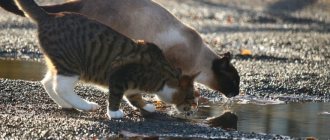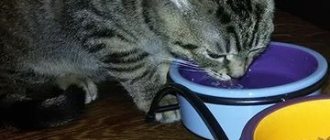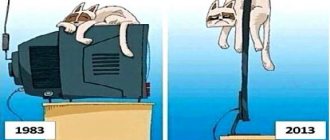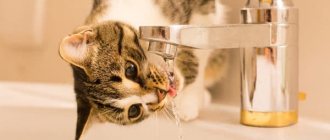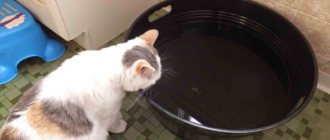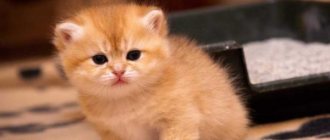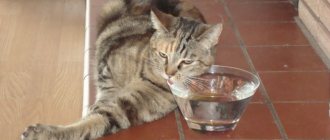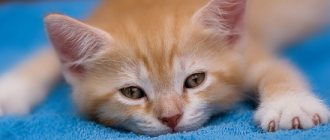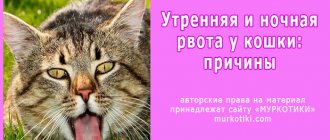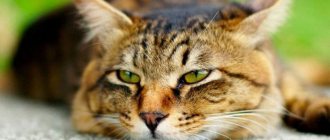Causes of exhaustion in cats Diagnosis Treatment
Exhaustion is weight loss in an animal as a result of an energy imbalance that occurs for various reasons.
Clinically significant weight loss in a cat is considered to be a loss of more than 10% of total body weight that is not due to fluid loss. At the same time, the animal’s appetite and activity may be completely normal, and most owners may postpone a visit to a veterinarian. However, serious illnesses can be among the causes of malnutrition in cats.
Causes of malnutrition in cats
There are many reasons why cats may lose weight. The main ones:
1. Eating disorders.
This problem may include:
- poor quality of feed,
- insufficient food
- decreased palatability of food (for example, low-protein diets),
- lack of appetite (anorexia), for example due to illness.
2. Metabolic disorders, impaired absorption of nutrients in the intestine.
Intestinal diseases can be caused by:
- parasites (giardia, coccidia, nematodes),
- intestinal tumors (for example, lymphoma),
- obstruction by a foreign body,
- viruses (coronavirus enteritis, panleukopenia).
In addition, malabsorption of nutrients in the intestine can result from:
- Lymphangiectasia is a rare disease among cats that results in chronic loss of protein through the intestinal wall;
- chronic bacterial or fungal diseases of the intestines,
- surgical removal of a large segment of the intestine - this reduces the total area of the intestine and, accordingly, its absorption of nutrients.
3. Digestive disorders.
- exocrine pancreatic insufficiency leads to insufficient secretion of pancreatic enzymes, which disrupts the processes of food digestion,
- disruption of the secretion of bile (which is also involved in the digestion process) due to diseases of the liver and bile ducts also leads to disruption of the digestion processes.
4. Metabolic disorders.
- diabetes mellitus – which reduces the body’s ability to use glucose from the diet, which can lead to exhaustion,
- hyperthyroidism – may help increase metabolism.
5. Excessive loss of nutrients.
This pathology includes:
- Protein-losing enteropathy is a group of diseases characterized by excessive loss of protein through the gastrointestinal tract,
- nephropathy, which results in loss of protein through the kidneys,
- chronic bleeding and burns.
6. Neuromuscular diseases.
Such diseases include paralysis of the esophagus and neurological disorders as a result of which the animal cannot eat.
7. Excessive use of calories by the body.
During prolonged physical activity, in a cold environment, during pregnancy, feeding kittens, during tumor processes or elevated body temperature, the cat’s body begins to actively use energy for warmth or for nutrition, as a result of which the energy balance may be disrupted, which leads to exhaustion and weight loss .
8. Chronic viral infections.
Infections such as viral peritonitis, leukemia and immunodeficiency can lead to weight loss in cats.
What to do if your cat stops eating
If there is no appetite for more than 24 hours and there are other signs of pathology (high fever, vomiting, diarrhea, discharge from the eyes, nose and genital tract), call a veterinarian immediately.
Long-term refusal to eat leads to weight loss (anorexia) and irreversible metabolic processes, which can result in damage to vital organs.
If you notice that your pet does not approach food for several days, be sure to show it to a specialist! Only a doctor can determine the exact cause, make a diagnosis and provide the necessary assistance.
How to avoid problems
To ensure that your cat is healthy and eats with pleasure, regularly sanitize the oral cavity.
What is included in the prevention of oral diseases:
- removal of non-viable teeth
- removal of tartar
- treatment of gums and buccal mucosa
It is also worth periodically undergoing medical examination by a veterinarian to identify diseases and their treatment.
Diagnostics
Due to the fact that there are many causes of exhaustion in cats, diagnosis is aimed at first excluding the most likely diseases - parasitic diseases, chronic kidney diseases, liver diseases, and food digestion disorders. In addition to a general examination and history taking, the veterinarian will also carry out the following diagnostic measures:
- Exclusion of parasites in the intestines using stool examination (for example, flotation).
- Complete clinical blood test to rule out anemia and inflammation.
- A complete biochemical blood test that will show the functioning of the liver, kidneys, levels of sugar, electrolytes and proteins in the blood.
- General clinical urine test - helps assess kidney function, detect infections, loss of protein from the kidneys.
- X-ray of the chest and abdominal cavity - to exclude a tumor process, foreign bodies in the gastrointestinal tract, free fluid in the chest or abdominal cavity and assess the size of internal organs.
- Ultrasound of the abdominal cavity - helps to evaluate the structure of the liver, kidneys, and examine the pancreas area. Ultrasound is used to search for tumors and foreign objects in the gastrointestinal tract, and to evaluate intestinal motility.
- Trypsin-like immunoreactivity test - used to diagnose certain diseases of the pancreas that lead to impaired digestion and absorption.
- Measuring thyroid hormone levels in older cats.
- Measurement of bile acid levels to assess liver function.
- Colonoscopy is an examination of the inner surface of the intestine with a thin endoscope, in which the condition of the intestinal mucosa is visually assessed, and sections of tissue are taken for analysis.
- An exploratory laparotomy is an operation that examines internal organs to make a diagnosis that was not made by other, less invasive tests.
Why does a cat eat poorly and lose weight?
Throughout their lives, cats may lose interest in food for periods of time. There are several reasons why a cat eats poorly and loses weight. This behavior in a pet may be associated with a behavioral disorder or physiological characteristics.
In some cases, loss of appetite indicates serious diseases of the internal organs caused by chronic illnesses or infections. Reasons not related to diseases, but causing loss of appetite in a cat, may be the following:
- The period of estrus and puberty. As a result of a strong hormonal surge, the pet's behavior changes dramatically - the cat shows aggression and becomes overly excited. Temporary anorexia during this period is not a pathology and should not cause concern to the owner. Without planning to have offspring from your furry pet in the future, veterinary experts recommend routine sterilization. Thus, it will be possible to avoid not only manifestations of sexual desire, but many related problems.
- Accumulation of hairballs in the stomach. The reason that a cat is losing weight and also eating little may be hairballs - trichobezoars - that have accumulated in the stomach. Under normal conditions, excess hair passes through the intestinal tract and is excreted in the feces. If the hairballs are too large, your pet cannot regurgitate them and the stomach becomes clogged and stretched. As a result of this, the cat eats little and loses weight, the animal retains stool, and the fur becomes unkempt.
- Stressful conditions of the animal. It happens that the animal looks absolutely healthy, its behavior does not change, except for refusing food. The reasons may be hidden in the psycho-emotional state of the pet. Stress in a cat can occur due to the appearance of another animal in the house or a small child, as well as during moving, punishment or after quarrels between animal owners.
- Feeding irregularities. Quite often, cat owners make the mistake of suddenly switching their pet to a new food. This may cause you to refuse food. To avoid this behavior in a cat, veterinarians recommend accustoming or switching the animal to a new type of food gradually. Feed must be fresh, without violations in storage technology. Cats refuse to eat spoiled food, as they naturally have a highly developed sense of smell.
- Age problems. Old cats become picky eaters, they are more likely to experience loss of appetite and associated weight loss. After the age of six, changes occur in the animal’s body and the process of assimilation of food changes. In addition, animals at an advanced age are often diagnosed with diseases of the teeth and gums. Inflammatory processes in the oral cavity lead to the fact that the animal tries to eat less, the cat loses weight and looks quite exhausted. The owner of an old animal is recommended to contact a veterinarian and consult about the selection of a new diet. Older cats prefer wet and soft food.
- Foreign objects in the mouth. When sharp objects eaten by a cat (bones, chips, blades of grass) become stuck, the animal refuses to feed due to the onset of the inflammatory process and severe pain. Foreign objects are especially often found in a kitten’s mouth, because due to their curiosity, babies try to taste everything. The pet looks hungry, meows pitifully, but at the same time cannot fully absorb food. This provokes weight loss and lethargy of the animal. It is important to promptly contact a veterinarian for assistance.
There are a number of diseases that affect the disturbance of appetite in an animal. Thus, various helminthiases and dangerous infectious diseases provoke the appearance of many symptoms, including nutritional disorders. Cats with helminth infections not only lose interest in food, but they may develop a perversion of taste preferences.
Among the infectious diseases that can cause a cat to refuse to eat are the following:
- Rabies. A dangerous disease characterized by refusal of food and severe depression of the animal’s general condition in the first stages. With the development of symptoms, hypersalivation, clouding of the cornea of the eye, exhaustion, eruption of gastric contents, and diarrhea with blood appear.
- Plague. An infectious disease that provokes an increase in body temperature to high levels, a sharp refusal to eat food and water, the appearance of vomiting and diarrhea.
- Leukemia virus. Against the background of a general weakening of the body’s immune forces, the cat develops inflammatory processes in the oral cavity (stomatitis, gingivitis), the functioning of the digestive system is disrupted, the body temperature rises, and the lymph nodes enlarge. The pet refuses to eat, loses weight sharply and loses interest in what is happening around.
- Viral enteritis. They cause disturbances in the gastrointestinal tract, causing profuse vomiting and diarrhea with mucus and blood. The cat refuses not only food, but also water. Dehydration develops quite quickly, the cat loses strength and may die without medical intervention.
Loss of appetite is also caused by disorders of the internal systems of the body that are not associated with infectious agents. Thus, the cause of loss of appetite and sudden weight loss in a cat may be diseases of the hepatorenal system (lipidosis, urolithiasis), diabetes mellitus, inflammatory processes in the intestines of an idiopathic nature.
One of the reasons for refusing food is cat poisoning. Intoxication of the body can occur as a result of a cat eating poisonous plants or poor-quality food. In addition, household chemicals and zoocoumarins (substances used to bait rodents) can cause poisoning. All types of poisoning, even medicinal ones, are accompanied by a refusal of food and a general state of lethargy in the cat.
Treatment
Depending on the diagnosis, malnourished animals may be advised to:
- Antibiotic therapy, treatment for worms, antibacterial drugs - for inflammatory or parasitic intestinal diseases.
- High-calorie quality diet.
- In some cases, force feeding or feeding through a tube.
- Parenteral (intravenous) nutrition – for cats unable to eat due to vomiting or regurgitation, illness.
- Surgical treatment is the removal of large tumors or foreign bodies from the intestine.
- Treatment of renal and liver failure, maintenance therapy.
(c) Veterinary center for the treatment and rehabilitation of animals “Zoostatus”. Varshavskoe highway, 125 building 1. tel. 8 (499) 372-27-37
Natural reasons for refusing water and food
It is not always the case that a cat does not eat or drink because of illness or injury. Cats are selective animals, and pets are also very capricious and picky. Therefore, the refusal may have the following reasons:
New food that your pet doesn't like. This can also happen if a new kitten was taken into the house and offered him food that he had not tried in the place where he lived before. Also, refusal can occur with a sharp transition from breastfeeding to feeding wet or dry food or natural products. You need to gradually accustom your kitten to them.
Contaminated food or water. Cats are very squeamish; they definitely won’t like dust in their water cup or stale food. Just standing it in the open air for half an hour is enough for the cat to stop eating. The same applies to dry food. If you pour a lot of “drying” into a bowl at once, the attractive smell will quickly disappear, and the contents of the feeder will no longer be perceived as food. Naturally, the cat will refuse to eat this “something”.
Stress, for example, from a change of place of residence, the appearance of a new owner or an addition to the family, including the purchase of another kitten or puppy. The animal suffers from jealousy, especially if it is not given as much attention as before. One way he can get attention is to stop eating.
The air temperature is too high. The cat's appetite sharply decreases and thirst increases. You need to take care of the constant availability of clean water and offer him lighter food, some kind of treat. You should not force feed; the cat will eat on its own when the temperature subsides. Most often this will be at night, so you should leave her a reserve for this time, otherwise she will wake up the whole house with screams.
An animal that feels unwell may refuse any food and even water for several days, or not eat, but only drink a little. This is a normal condition if not accompanied by other dangerous symptoms. This can be done by cats recovering from illness or surgery, those who have experienced a difficult birth, and those who have just entered puberty. The first heat or rut can trigger a strong release of hormones, and this leads to loss of appetite.
How does a cat eat?
In general, cats' eating habits depend on the quantity/quality of food available to them, as well as previous experience. Psychological and physiological components also have an impact.
Wild cats have a higher calorie diet, but food is not freely available, like in domestic animals. Therefore, pets prefer to eat throughout the day, distributing food intake. However, in domestic cats, the predatory instinct prevails over the food instinct. This means that when a cat sees a bird or a mouse, it will easily give up even its favorite food and start hunting. Having caught prey, he can just as easily leave it untouched, returning to the food.
If you give your animal food that is high in calories, the animal will prefer to eat it in several servings (quite large in volume). Active pets prefer to eat according to the same principle.
How to determine the cause of loss of appetite
Try offering the animal a different food: perhaps he is not satisfied with the taste of the food he consumed before. In this case, the cat's behavior will change.
In other cases, the cause of loss of appetite can only be determined by carefully studying the cat’s feeding habits, its behavior and living conditions, and previous (or currently ongoing) therapy. To do this, contact a veterinary clinic, where the doctor will prescribe all the necessary tests.
Basic diagnostic tests usually include a complete blood count, complete stool/urine analysis, serum biochemical analysis, tests for the presence of infections in the body, ultrasound examination of the abdominal cavity, biopsy of the mucous membrane, etc.
Treatment and prevention of poor appetite
Problems such as loss of appetite should be addressed by a veterinarian. If necessary, he selects medications that help increase appetite. In this case, the pet owner will need to clearly control the amount and calorie content of food eaten. The cat may also be prescribed B vitamins. Before visiting the veterinary clinic, try to keep the cat in good shape: eliminate pain and disturbances in water-salt metabolism in the body, and ensure there are no stressful conditions. Offer your pet food with high palatability.
To make the food more tasty, try adding meat extract to it and heating the food (this will enhance its smell). However, this diet is not balanced, so you can give your cat this food for no more than 2-3 weeks.
